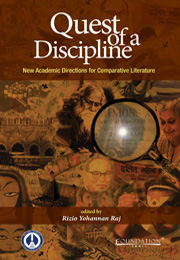Book contents
- Frontmatter
- Contents
- List of Contributors
- Acknowledgements
- Prologue to the “Quest'
- Introduction
- PART I Traditions and Manifestoes: Reflecting on Perspectives
- PART II The Quest Motif: Redefining the Scope of Comparative Literature
- 4 Beyond ‘Other Words’: The ‘Relevance’ of Translatology as Comparative Literature
- 5 Intertextual Lores and the Play of Language: Folklore/Orality in the Comparative Context of Literature
- 6 Towards a Comparative Performance Studies
- 7 Media Studies and the Academic Elite
- 8 Comparative Film Studies: The Culture Studies Turn in Comparative Literature
- 9 Finding Space in the Margin: Teaching Women's Literature in a Comparative Perspective
- PART III The Dynamics of Exchange: Genres, Areas and Disciplines
- PART IV India: A Curious Comparative Space
- Afterword: Comparative? Literature?
- Index
8 - Comparative Film Studies: The Culture Studies Turn in Comparative Literature
from PART II - The Quest Motif: Redefining the Scope of Comparative Literature
Published online by Cambridge University Press: 05 June 2012
- Frontmatter
- Contents
- List of Contributors
- Acknowledgements
- Prologue to the “Quest'
- Introduction
- PART I Traditions and Manifestoes: Reflecting on Perspectives
- PART II The Quest Motif: Redefining the Scope of Comparative Literature
- 4 Beyond ‘Other Words’: The ‘Relevance’ of Translatology as Comparative Literature
- 5 Intertextual Lores and the Play of Language: Folklore/Orality in the Comparative Context of Literature
- 6 Towards a Comparative Performance Studies
- 7 Media Studies and the Academic Elite
- 8 Comparative Film Studies: The Culture Studies Turn in Comparative Literature
- 9 Finding Space in the Margin: Teaching Women's Literature in a Comparative Perspective
- PART III The Dynamics of Exchange: Genres, Areas and Disciplines
- PART IV India: A Curious Comparative Space
- Afterword: Comparative? Literature?
- Index
Summary
INTRODUCTION
All round the world the term ‘comparative’ is yielding place to ‘cultural’. This shift from the generic neutrality of Comparative Studies with its emphasis on commonalities and similarities to the politicality of Cultural Studies is a shift that can be linked to the rise in popularity of critical theories and to more radical notions regarding ‘text’, ‘textuality’ and ‘literature’. Also many young scholars work on the presumption that literature is ‘somehow elitist and politically suspect of being part of a complicity with power, representing conservative values of a repressive tradition…’ (Longxi in Saussy 231). Thus, it has become imperative that one addresses the newer perspectives and possibilities within Literary Studies in the process of strengthening the discipline of Comparative Literature.
The Vision and Function of Comparative Literature
On 28 August 1992, when the Centre for Comparative Literature in University of Kerala was inaugurated by the late Kamala (Surayya) Das, Dr Jancy James, the founding director of the centre delivered a lecture titled ‘Comparative Literature as Academic Discipline’. She said:
Comparative Literature addresses itself to a mode of responding to literature in all its totality of insights and concerns. It presupposes that no literature or author can be meaningfully studied in isolation. In the contemporary critical climate, in which literary responses not only approximate but also transcend the sources of creative process, and reconstruct a fresh artifact out of the deconstructed ruins of literary work, the tasks of reading and appreciation have come to mean a much more pervasively searching business than before. […]
- Type
- Chapter
- Information
- Quest of a DisciplineNew Academic Directions for Comparative Literature, pp. 130 - 142Publisher: Foundation BooksPrint publication year: 2012



